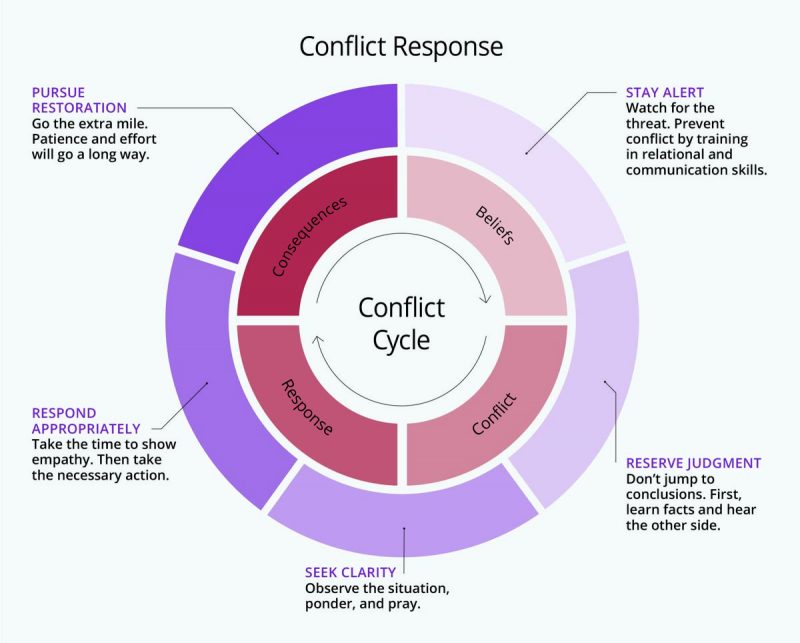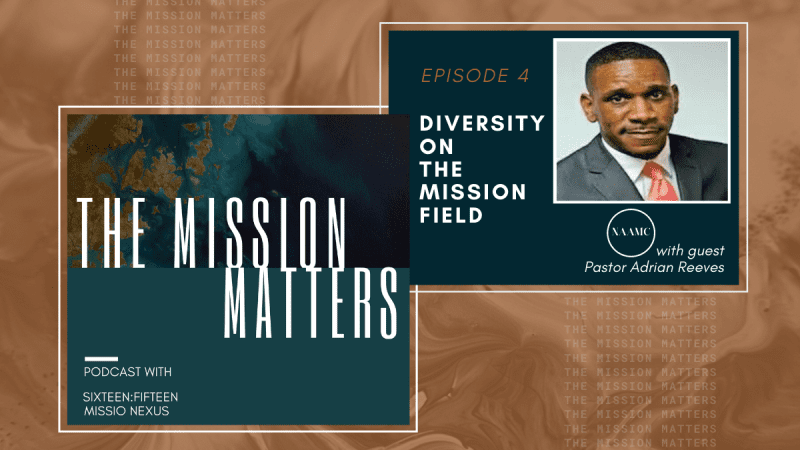Breaking the Conflict Cycle

By Steve Richardson
There is a great need for spirit-let peacemakers who humbly seek counsel and take action to restore relationships.
Many of us watched with horror as the space shuttle Challenger blew up seventy-three seconds after lift-off from Cape Canaveral on January 28, 1986. It was later determined that two rubber O-rings had failed. A small jet of pressurized gasses and flame eventually penetrated the adjacent solid rocket booster, resulting in a disastrous explosion that killed all seven astronauts.
In leadership, we know that small disagreements, like that plume of flame, can metastasize into large and enduring conflicts. God calls us to serve like rubberized O-rings. As his peacemakers, our task is to stop the escalating spiral of misunderstanding, broken trust, and destructive reactions and behaviors that typify so many unfortunate interactions between God’s people.
Joshua chapter twenty-two recalls an oft-overlooked episode in Israel’s history. It is a time of national euphoria. The two and a half tribes on the east side of the Jordan have fought side by side with their brothers for several years. God has given them victory after victory. The Canaanite kingdoms have now been vanquished. With Joshua’s blessing, it is time for them to collect the spoils of war and return to their homes and families across the river.
Before crossing the Jordan, however, they pause to build an imposing altar of stones in remembrance of the unity they have enjoyed. The altar’s purpose, interpreted against the backdrop of a long history of idolatry and painful learning experiences, is completely misunderstood by the western tribes. Israel finds itself suddenly on the verge of a civil war. Calamity is averted only through some swift and skilled leadership. This dramatic story provides five powerful guidelines for pre-empting, navigating and breaking the conflict cycle.
One: Stay Alert
Cycle breakers are those who become skilled at perceiving a threat (vv. 10–12). As believers, we are not exempt from conflict. The Bible has many accounts of godly people–Joseph, Moses, David, Paul and Barnabas, Euodia, and Syntyche, to name a few–who encountered serious conflict. Sometimes, the most difficult conflicts are between friends who have worked together for a long time. Even amid great victories, we should maintain vigilance for the unity of the body of Christ. Any perceived threat to the unity of the body should be committed to prayer, and possibly to action, earlier rather than later. Like fighting forest fires, prevention and early detection are the best policy. Training in relational and communication skills before a conflict arises can be very helpful. Then, when conflict does arise, it can be leveraged as a teaching and growth opportunity.
Two: Reserve Judgment
Cycle breakers don’t jump to conclusions (vv. 12–14). They ponder the situation prayerfully before speaking. Reserving judgment, however, doesn’t mean ignoring the threat. Israel selected an experienced and respected mediator, Phinehas, to lead an investigative delegation. Numbers 25:11 describes the zeal with which Phinehas had previously defended God’s honor. Everyone would respect him. Seeking counsel from the right people is always a good idea. Always try to learn the facts and hear the other side before arriving at conclusions.
Three: Seek clarity
Cycle breakers ask good questions (vv. 15–20). The western delegation described their perception of the situation and why they were alarmed. Then they invited a response. As it turns out, the eastern tribes were horrified at what they heard. The interpretation of the altar was precisely the opposite of what they had intended! It’s an illustration of how we need to be careful in judging the motives of others. The reality may be very different than what you are imagining. Is it possible that both parties may be motivated by their zeal for God’s glory? Before taking definitive action, take the time to gather information, observe, ponder, and pray.
Four: Respond appropriately
Cycle breakers don’t watch and ponder forever. They take necessary action (vv. 31–32). In Israel’s case, this involved dispatching a delegation, entering into an emotional dialogue, and doing some careful listening. A gift of time and empathy can do wonders to break a cycle of conflict. “Make every effort to keep the unity of the Spirit through the bond of peace” (Ephesians 4:3). Taking some initiative to break the ice in a spirit of humility can do much to restore a threatened relationship. It’s hard work, but the more we are willing to step out and take risks that are motivated by love, the more our confidence will grow.
Five: Pursue Restoration
Cycle breakers don’t stop at seeking clarity, or even at achieving mutual understanding. They will go the “extra mile” to solidify a spirit of good will and a sense of wellbeing (vv. 33–34). The immediate aftermath of a conflict can be a tender and vulnerable time. A new mindset needs to be established. After Phinehas’ encouraging report, Israel was reassured and “talked no more of going to war.” Instead, they celebrated their common passion for unity and God’s honor.
Galatians 6:1 reminds us, “Brothers, if someone is caught in a sin, you who are spiritual should restore him gently.” Similarly, as peacemakers, we realize that a restored relationship has the potential to be even stronger than it was prior to the conflict. Ideally, both parties will grow through the process. It’s sometimes possible, as in the case of Joseph and his brothers, to reverse the impact of Satan’s intended evil, to turn stumbling stones into stepping-stones. Often, this takes time and a lot of patient effort, but it’s a worthy goal. As we learn to master cycle-breaking skills and patterns, we can begin to view delicate situations as growth opportunities rather than crises to be feared.
As the battle rages for peoples’ souls and for world evangelization, there is great need for Spirit-led peacemakers. The enemy wants to pit kingdom workers against one another. Modern-day Phinehases have a vital role to play and a special place in God’s heart.
Steve Richardson is President of Pioneers-USA. He holds a BA in Bible and MA in Missions from Columbia International University.







